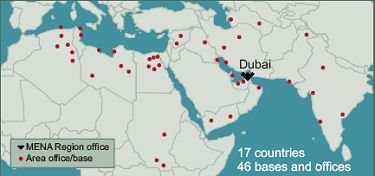 Houston-based oil-drilling and oilfield services company Weatherford announced yesterday in its 8-K filing with the SEC that the company has
Houston-based oil-drilling and oilfield services company Weatherford announced yesterday in its 8-K filing with the SEC that the company has
been notified that the Bureau of Industry & Security and the U.S. Department of Justice are investigating allegations of improper sales of products and services by us in sanctioned countries. We are cooperating fully with this investigation. In cooperation with the government, we have retained legal counsel, reporting to our audit committee, to investigate this matter. The investigation is in its preliminary stages.
It’s probably not to hard to guess what sanctioned country is involved. A map of Weatherford offices published in the September 2005 edition of W magazine, a Weatherford publication, tells the story:

Looks like three locations in Iran to me.
Of course, a foreign subsidiary of a U.S. company can do business in Iran provided that the foreign subsidiary has business in other countries (in other words, is not a device to evade the sanctions) and provided its operations in Iran are not controlled by the parent. Complying with the second condition — i.e. isolating the Iranian operation from control by the U.S. parent — is what normally creates a problem. Even something as innocent as U.S. approval of a travel and expense voucher in Iran from the foreign subsidiary can raise questions — particularly in an environment where U.S. officials are making louder and more frequent noises about swatting companies doing business in Iran.
 Permalink
Permalink
Copyright © 2007 Clif Burns. All Rights Reserved.
(No republication, syndication or use permitted without my consent.)

 Posted by
Posted by  Category:
Category: 

